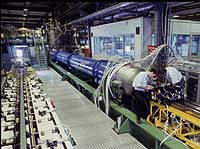|
CERN and the Big Bang
|

How
do experiments at CERN improve our understanding of
the early universe? Click the photo above to hear
Dr. Alvaro
De Rujula
explain. You will need the
RealPlayer
in order to view this video.
|
In
the first few minutes after the Big Bang, the universe was
far hotter -- billions of billions of billions of degrees
hotter -- than anywhere in the universe today. This heat
gave particles of matter in the early universe an extraordinary
amount of energy, causing them to behave in a much different
way from particles in the universe today. For example, particles
moved much faster back then and collided into one another
with much greater energy.
If
these conditions do not exist anymore, how do scientists
study the behavior of matter in the early universe? One
of the most powerful tools for such analysis is the particle
accelerator. This device allows physicists to recreate conditions
just after the Big Bang by making a beam of fast-moving
particles and bringing them together in very high-energy
collisions.
Researchers at CERN are using an accelerator called the
Large Hadron Collider
(LHC)
to accelerate subatomic particles called protons to close
to the speed of light. This is how fast scientists believed
these particles moved in the instants after the Big Bang.
By looking at the behavior of these protons, CERN physicists
hope to better understand how the Big Bang created the universe.

photo:
CERN
When
completed in 2005, the
Large Hadron Collider
at CERN will provide
new insight into the past, present and future
of our universe.
|
|
What
is the fate of the universe?
The
Big Bang theory raises some important questions about
the fundamental nature of the universe: Will the expansion
of the universe, set in action by the Big Bang, continue
forever? Or will gravity stop the expansion and eventually
cause all the matter in the universe to contract in
a Big Crunch?
Scientists don't yet know the answers to these questions
for certain. But particle physics experiments like
the accelerator studies at CERN may offer some clues
down the road. By probing into what matter is made
of and how it behaves, such experiments can help us
explore what the matter in our universe--the planets,
stars, and galaxies--might be doing billions of years
from now.
|
EXTERNAL
LINKS
For more information on the Big Bang:
A
Trip through the Big Bang
BBC
Interactive Timeline
NASA
Origins
PBS:
Stephen Hawking's Universe
Scientific
American article: Fireballs of Free Quarks
|